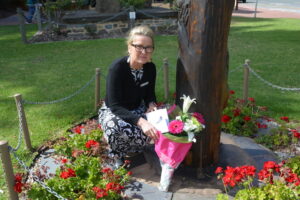
Researchers at the University of Wollongong are developing a groundbreaking treatment for pancreatic cancer, a disease known for its late diagnosis and poor survival rates. The innovative device, named ResectAssistTM, measures slightly larger than a grain of rice and smaller than a Tic-Tac. It is designed to deliver drugs directly to pancreatic tumours, potentially making surgery a viable option for patients diagnosed with this aggressive cancer.
Pancreatic cancer affects around 4,500 people in Australia annually, and often, patients are diagnosed at advanced stages, limiting their chances of survival. According to the Australian Institute of Health and Welfare, nearly 220 individuals in the Illawarra region succumbed to the disease between 2018 and 2022, marking it as one of the top 20 causes of death in the area.
Associate Professor Kara Vine-Perrow, the lead researcher on this project, explained that many patients are ineligible for surgical intervention because of the complex nature of the tumours and the late-stage diagnoses. “When we deliver drugs through the bloodstream, conventional chemotherapy struggles to penetrate the tumour because of its dense, fibrotic tissue,” she stated. This unique microenvironment shields cancer cells from the immune system, complicating overall treatment.
The ResectAssistTM device aims to overcome these barriers by being directly implanted into or around the tumour. This allows for localized delivery of high drug concentrations, effectively targeting the cancer cells while minimizing systemic exposure and reducing side effects. The device’s composition includes polymers and a specific mix of drugs, engineered to control the rate and amount of drug released over time.
Prof. Vine-Perrow emphasized that the implantation could be achieved through a minimally invasive gastrointestinal procedure already utilized for diagnosis and staging of pancreatic cancer. This approach could shrink the tumour sufficiently to make surgical removal feasible.
Recently, the research team secured a $500,000 grant aimed at supporting significant research and commercialisation efforts. This funding will enable the team, which includes researchers from the University of South Australia, to transition their work into human trials. “We have made significant progress with pre-clinical testing and are now looking to validate our findings,” Prof. Vine-Perrow remarked.
The next phase involves using medical-grade materials for the implants and developing robust manufacturing methods necessary for clinical trials. While the primary focus remains on pancreatic cancer, Prof. Vine-Perrow noted the potential application of this technology for other cancers, including breast and brain cancers.
The development of ResectAssistTM has been bolstered by local community support, particularly from the Illawarra Cancer Carers, a volunteer group committed to cancer research. Prof. Vine-Perrow acknowledged their vital role in sustaining the project through fundraising efforts.
As November 2023 marks Pancreatic Cancer Awareness Month, the advancements made by the University of Wollongong’s research team highlight the ongoing battle against one of the most challenging forms of cancer. This promising treatment represents hope not only for patients facing pancreatic cancer but potentially for those suffering from other malignancies as well.






